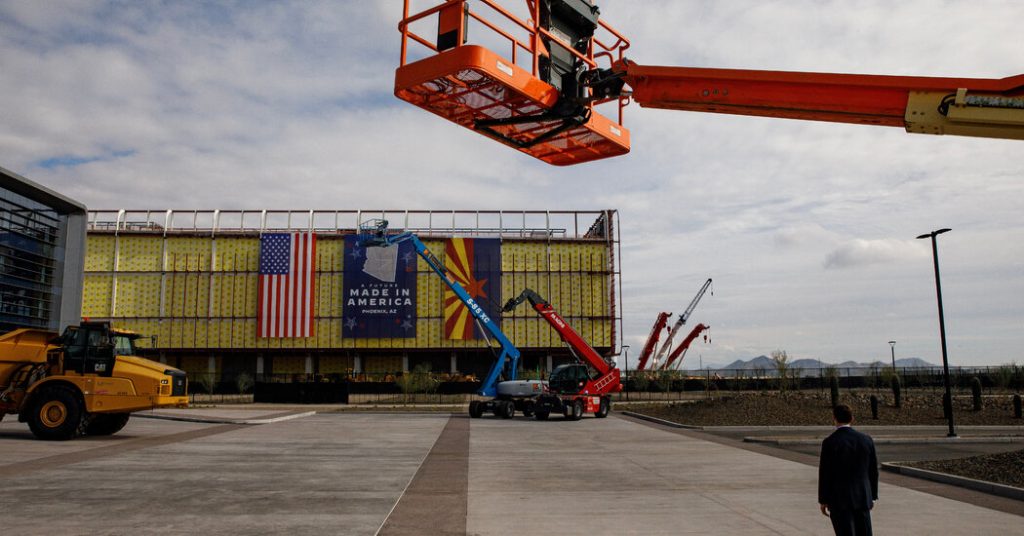A Historic Investment in America’s Semiconductor Future
President Donald Trump announced on Monday that Taiwan Semiconductor Manufacturing Company (TSMC), the world’s largest chip manufacturer, has committed to investing $100 billion in the United States over the next four years. This monumental investment will significantly expand TSMC’s production capacity in Arizona and bring its most advanced semiconductor technologies to American shores. The move is a major step toward reducing U.S. reliance on foreign chip production, a critical issue for national security and economic competitiveness.
Mr. Trump revealed that this investment will enable TSMC to begin manufacturing artificial intelligence (AI) and smartphone chips in Arizona. This marks a significant shift in TSMC’s operations, as it will now produce cutting-edge chips in the U.S., rather than solely in Taiwan. The expansion will also grow TSMC’s footprint in Arizona from three manufacturing plants to six, creating 25,000 jobs and establishing a research and development center to pioneer future semiconductor technologies. With this commitment, TSMC’s total planned spending in the U.S. now stands at $165 billion, signaling a long-term dedication to strengthening American chip production.
A Boost to National Security and Economic Resilience
The announcement comes after years of growing concern among U.S. officials about the nation’s reliance on foreign semiconductor manufacturing. TSMC’s dominance in the global chip industry has long raised national security risks, as the majority of advanced chips are produced in Taiwan. With China’s increasing aggression toward Taiwan, there were fears that the U.S. could lose access to these critical components, which power everything from smartphones to military systems. By bringing advanced chip production to the U.S., TSMC’s investment directly addresses these concerns and strengthens America’s economic and strategic resilience.
During a White House event, Mr. Trump emphasized the importance of semiconductors to the 21st-century economy. “Semiconductors are the backbone of the 21st-century economy, and really, without semiconductors, there is no economy,” he said. The President underscored the need for the U.S. to produce these vital components domestically, ensuring American factories, skills, and labor are at the forefront of the global chip industry. This vision aligns with broader efforts to bolster domestic manufacturing and reduce dependence on international supply chains.
TSMC’s Chief Executive, C.C. Wei, joined Mr. Trump at the event to confirm the company’s plans. He highlighted that the expansion has garnered strong support from major American customers, including Apple, Nvidia, AMD, Qualcomm, and Broadcom. These companies rely heavily on TSMC’s cutting-edge chips, and the ability to produce these components in the U.S. will streamline their supply chains and reduce geopolitical risks.
Revving Up Domestic Manufacturing: A Decade of Effort
TSMC’s decision to expand its U.S. operations is the culmination of years of efforts by both the Trump and Biden administrations to revitalize domestic semiconductor production. The Trump administration initially began lobbying TSMC to build plants in the U.S., recognizing the strategic importance of chip production to national security. These efforts gained momentum under President Biden, who championed the passage of the bipartisan CHIPS Act. This landmark legislation allocated $39 billion in federal funding to support the construction of new and expanded semiconductor manufacturing facilities in the U.S.
The CHIPS Act has played a pivotal role in attracting TSMC’s investment. Initially, the company had planned to invest $65 billion in Arizona to build three factories, with support from $6.6 billion in federal funding. However, the new commitment of $100 billion significantly expands the scope of TSMC’s U.S. operations. While the initial plans focused on older, less advanced chip technologies, the new investment will bring TSMC’s state-of-the-art semiconductor processes to America, ensuring the U.S. remains a global leader in chip innovation.
TSMC’s Expansion: Jobs, Innovation, and Global Leadership
The scale of TSMC’s investment in the U.S. is unprecedented and represents a transformative moment for the American semiconductor industry. Over the next four years, the company will not only expand its manufacturing capacity but also establish a research and development center in Arizona. This facility will focus on pioneering future production processes, ensuring that the U.S. stays at the forefront of chip technology.
The economic impact of TSMC’s expansion will be substantial. In Arizona alone, the company’s operations will grow from three factories to six, creating 25,000 jobs and generating significant economic activity. Beyond direct employment, the investment will also stimulate growth in related industries, such as chip design, materials supply, and equipment manufacturing. This ripple effect will further solidify the U.S. as a hub for semiconductor innovation and production.
Moreover, TSMC’s commitment signals a shift in the global semiconductor landscape. By producing advanced chips in the U.S., the company is reducing its reliance on Taiwanese production, which has been a focal point of geopolitical tensions. This move aligns with the broader goal of diversifying global supply chains and ensuring that critical technologies are produced in allied nations.
The Role of Tariffs and Diplomacy in Shaping TSMC’s Decision
President Trump also highlighted how the threat of tariffs influenced TSMC’s decision to invest in the U.S. Since taking office in January, Mr. Trump had threatened to impose tariffs of up to 100% on chips manufactured in Taiwan, a move that would have significantly increased costs for TSMC and its customers. While the CHIPS Act provided financial incentives, the prospect of avoid


